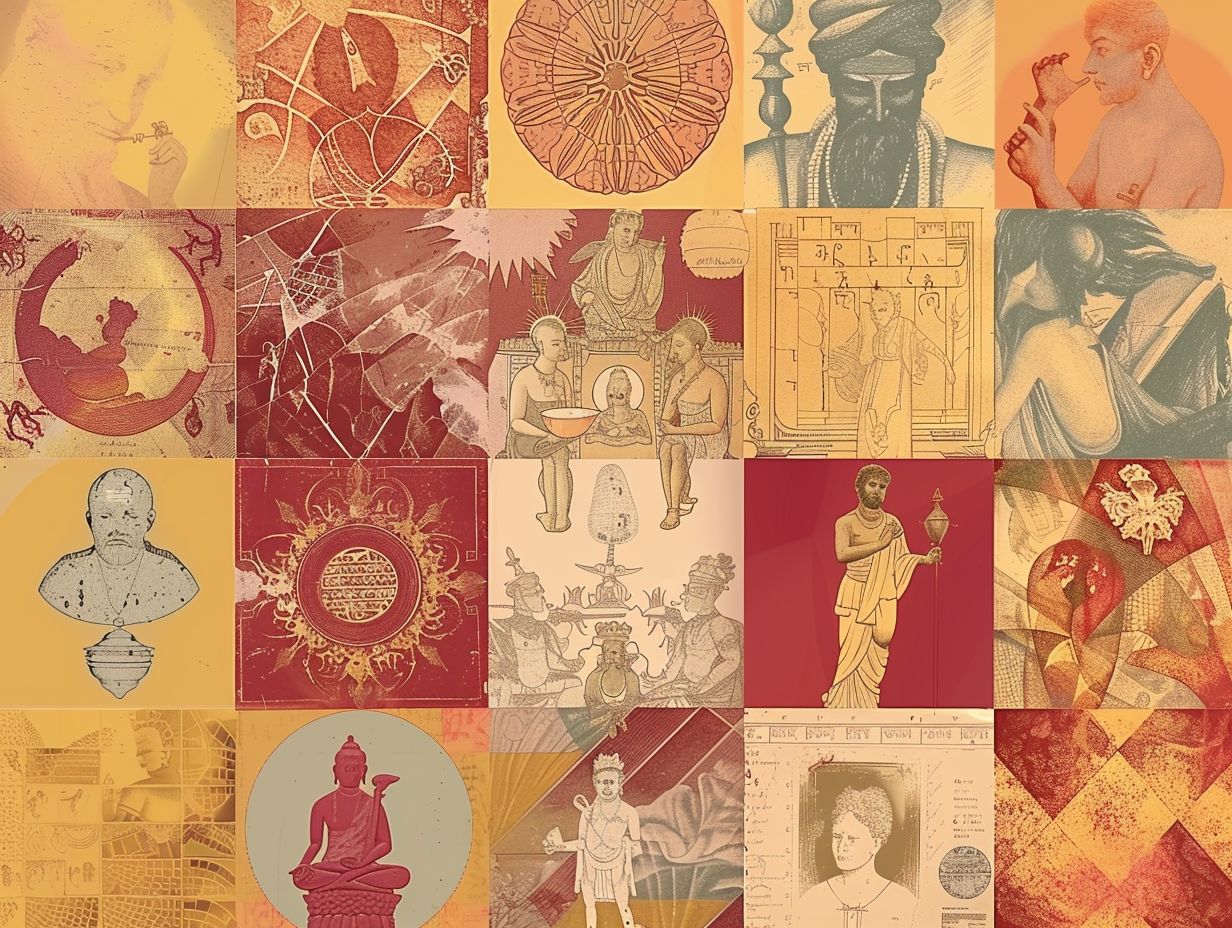Comparison with Other Nastika Schools
Exploring the rich tapestry of Indian philosophy reveals a fascinating division between the Nastika and Astika schools of thought. This discourse delves into the various Nastika traditions, including Charvaka, Jainism, and Buddhism, each distinguished by its unique beliefs and practices.
Furthermore, the similarities and differences between these Nastika schools and their Astika counterparts will be illuminated, particularly concerning critical concepts such as the existence of God, the significance of the Vedas, and notions surrounding karma and reincarnation.
This enlightening journey through philosophical thought promises to showcase the profound impact that these ideas have had on shaping Indian culture for centuries.
What are the Different Nastika Schools?

The Nastika schools embody a captivating diversity of philosophical traditions within ancient Indian thought, standing in contrast to the Astika schools that uphold the authority of the Vedas.
These schools, which include Charvaka, Jainism, Buddhism, Ajivika, Samkhya, Yoga, Mimamsa, and Vedanta, each provide distinctive insights into essential philosophical questions surrounding metaphysics, epistemology, and ethics.
Their emergence was shaped by a complex interplay of historical contexts and cultural dynamics, reflecting a rich tapestry of intellectual discourse and existential inquiry. This examination unveils their doctrines, beliefs, and practices, offering profound insights into the spiritual philosophies that have significantly influenced the human experience.
1. Charvaka
Charvaka, an ancient Indian school of thought, is distinguished by its materialistic and skeptical approach to philosophical inquiry, firmly rejecting the notions of an afterlife and divine entities.
This philosophy presents a striking contrast to many orthodox schools of thought, championing a naturalistic worldview in which empirical evidence and sensory perception are deemed the sole sources of knowledge. By advocating for a pragmatic approach to ethics and dismissing metaphysical speculation, Charvaka calls into question the validity of rituals and doctrines upheld by established traditions.
This critical stance encourages individuals to pursue happiness and fulfillment in the tangible realm rather than through abstract beliefs or spiritual promises. The historical significance of Charvaka resides in its challenge to conventional religious norms, thereby paving the way for more rational discourse within Indian philosophy and beyond.
2. Jainism
Jainism represents a profound spiritual tradition, placing a distinct emphasis on non-attachment, asceticism, and the pursuit of liberation (moksha) through ethical living and an intricate understanding of karma. This ancient belief system exerts a significant influence on its adherents, guiding them toward a life characterized by compassion, truthfulness, and non-violence (ahimsa).
At the core of Jain teachings is the pivotal concept of karma, which asserts that every action be it a thought, word, or deed carries consequences that can either draw an individual nearer to spiritual liberation or bind them to the repetitive cycles of reincarnation. Jains advocate the notion that true liberation arises from living a life aligned with these principles, fostering a robust ethical framework that resonates with parallel philosophical traditions such as Buddhism and Hinduism.
Through rigorous practices including fasting, meditation, and self-discipline, Jains endeavor to purify their souls, thereby promoting a harmonious coexistence that enriches their spiritual journeys.
3. Buddhism
Buddhism, which was founded by Siddhartha Gautama, places a significant emphasis on the practice of mindfulness and the realization of non-dualism as a pathway to enlightenment and liberation from the cycles of samsara. This spiritual tradition invites its followers to cultivate a heightened awareness of their thoughts and actions, thereby fostering a profound ethical framework that informs personal conduct and interactions with others.
At the heart of Buddhism lie its central teachings, including the Four Noble Truths and the Eightfold Path, which provide essential guidelines for transforming one’s mindset and alleviating suffering. Throughout the centuries, Buddhism has evolved into various schools and practices, adeptly adapting to diverse cultural contexts while also making substantial contributions to philosophical dialogues regarding metaphysics and existential inquiries.
This rich heritage continues to inspire millions around the globe, advocating values of compassion, interconnectedness, and inner peace.
4. Ajivika
The Ajivika school, distinguished by its deterministic worldview, asserts that karma serves as the sole arbiter of one’s fate, thereby carving out a distinct spiritual path and philosophical perspective. This belief encapsulates a radical stance wherein individual actions are deemed inconsequential in altering the course of one’s life, prompting practitioners to adopt a mindset of resignation and acceptance.
Within this framework, each individual’s karmic imprint is regarded as predetermined, effectively negating the concept of free will. This position stands in stark contrast to other philosophical traditions, such as Buddhism and Jainism, which underscore the transformative potential of conscious actions.
Historical critiques from contemporaries have characterized this deterministic outlook as excessively fatalistic, arguing that it restricts personal agency and moral responsibility. Such critiques have ignited ongoing debates about the implications of this worldview for ethical behavior and the pursuit of spiritual liberation.
5. Samkhya

Samkhya represents a dualistic philosophy that delineates the distinction between consciousness (Purusha) and matter (Prakriti), offering a profound metaphysical framework aimed at achieving liberation through the pursuit of knowledge.
This foundational separation enables individuals to grasp the essence of reality and their role within it, illuminating the transformative potential inherent in self-awareness. Through the engagement with this knowledge, practitioners are equipped to recognize the illusion of attachment to material existence, which is ultimately the root of suffering.
The influence of Samkhya extends well beyond its own tenets, playing a pivotal role in the evolution of various philosophical systems, particularly Yoga. In Yoga, one can witness the practical application of Samkhya principles, as they guide the aspirant on a journey toward spiritual freedom through disciplined practices, profound introspection, and meditation.
Collectively, these guiding philosophies forge a comprehensive path to enlightenment, underscoring the necessity of maintaining a harmonious balance between Purusha and Prakriti.
6. Yoga
Yoga, a profound philosophical and spiritual discipline, encompasses a diverse array of practices designed to cultivate mindfulness, facilitate meditation, and ultimately achieve liberation from suffering.
The term itself is steeped in antiquity, reflecting a rich historical evolution that traces back thousands of years within Indian culture. As time has progressed, yoga has diversified into several forms, including Hatha, Vinyasa, and Kundalini, each presenting unique methodologies for physical postures, breath control, and meditation techniques.
These practices often weave in spiritual dimensions, underscoring the significance of ethical principles such as the Yamas and Niyamas, which advocate for virtues like non-violence and self-discipline.
In contemporary society, yoga continues to exert a profound influence on spiritual traditions, championing holistic well-being and nurturing spiritual growth in a world increasingly attuned to mindfulness and the pursuit of inner peace.
7. Mimamsa
Mimamsa, deeply rooted in Vedic traditions, centers on the interpretation of ancient texts while underscoring the importance of rituals and ethical duties (dharma) in human life. This philosophical system advocates for a thorough understanding of the purpose behind Vedic injunctions, promoting a meticulous analysis of the texts to reveal their profound meanings.
Practitioners of Mimamsa immerse themselves in the structure and language of the scriptures, diligently discerning the rules and principles that govern righteous action. By prioritizing ritual performance as a means to uphold both societal and individual ethics, this approach illuminates the intricate relational dynamics between the self, society, and the divine. The inquiries raised by Mimamsa resonate across various cultural contexts, significantly influencing Indian thought and moral frameworks.
8. Vedanta
Vedanta, a distinguished philosophical tradition, emphasizes non-dualism and the ultimate realization of the self (Atman) as intrinsically united with Brahman, the supreme reality, through rigorous spiritual inquiry. This profound approach invites individuals to transcend the illusion of separateness, urging them to engage deeply in self-exploration and contemplation.
By looking into the essence of existence and recognizing the interconnectedness of all beings, individuals can uncover profound insights into their true nature. The teachings of Vedanta have significantly shaped various spiritual traditions and modern methodologies, attracting seekers eager to comprehend their spiritual heritage.
Through practices such as meditation, ethical living, and devotion, practitioners are guided toward harmony and enlightenment, cultivating a sense of unity with the cosmos that resonates powerfully in contemporary spiritual discussions.
What are the Similarities and Differences Between Nastika and Astika Schools?
The philosophical dialogue between the Nastika and Astika schools unveils significant similarities and differences in their perspectives regarding the existence of God, the authority of the Vedas, and their respective approaches to ethical living and spiritual philosophies.
This intricate discourse not only highlights their distinct beliefs but also offers a rich tapestry of thought that reflects the complexity of human understanding in the realm of spirituality and ethics.
1. Beliefs about the Existence of God

The beliefs surrounding the existence of God present a stark contrast between the Nastika and Astika schools of thought. Proponents of the Nastika perspective frequently advocate for atheism and skepticism, while adherents of the Astika tradition firmly uphold the existence of a divine entity. This divergence not only underscores differing philosophies but also encapsulates the broader discourse between rationalism and faith.
Advocates of the Nastika viewpoint often scrutinize traditional doctrines, placing a premium on empirical evidence and logical reasoning as the cornerstones of their understanding of existence. They challenge the concepts of divinity and supernatural intervention, offering a worldview that prioritizes human experience and observable phenomena. Conversely, followers of the Astika schools embrace spiritual texts and the metaphysical realm, asserting that belief in God imbues life with meaning and purpose.
This rich tapestry of perspectives fosters a stimulating dialogue, inviting individuals to delve into their own beliefs regarding spirituality and the nature of reality.
2. Views on the Vedas
Nastika schools typically reject the authority of the Vedas, standing in stark contrast to Astika schools that regard Vedic texts as foundational to their spiritual and philosophical explorations.
This fundamental divergence gives rise to a spectrum of interpretations, with proponents of Astika arguing that the Vedas encapsulate essential truths concerning existence and morality, thereby guiding individuals toward enlightenment and a deeper understanding of the universe. In contrast, practitioners from the Nastika perspective critique the Vedas for perpetuating hierarchical structures and rituals that they believe may obstruct personal spiritual growth.
Historical debates between these viewpoints unveil profound philosophical implications regarding the nature of authority, knowledge, and the role of sacred texts in shaping human behavior. These discussions not only illuminate ancient Indian thought but also resonate with contemporary dialogues surrounding tradition, modernity, and the quest for individual autonomy.
3. Concepts of Karma and Reincarnation
The concepts of karma and reincarnation are interpreted distinctly within the Nastika and Astika schools of thought, each carrying unique implications for their ethical frameworks and beliefs regarding the human experience.
These philosophical traditions engage with profound ethical dilemmas and existential inquiries, looking into the intricate interplay between one s actions and their consequences across lifetimes. In the Astika schools, which recognize the authority of the Vedas, karma is frequently perceived as a moral law governing rebirth. This perspective posits that virtuous deeds yield favorable outcomes in subsequent existences, emphasizing moral responsibility and the pursuit of liberation (moksha) from the relentless cycle of birth and death.
In contrast, Nastika viewpoints, such as those found in Buddhism, challenge the idea of a permanent self, raising questions about the functioning of karma within a transient existence. In this context, ethical considerations shift towards mindfulness and the ramifications of one s actions in alleviating suffering, offering a more nuanced understanding of ethics that transcends mere adherence to doctrine.
4. Practices and Rituals
The practices and rituals within the Nastika and Astika schools reveal their distinct perspectives on spirituality.
Astika schools typically emphasize ritualistic practices rooted in Vedic traditions, while Nastika schools lean toward more experiential or rational methodologies.
For example, the Astika traditions, which uphold the authority of the Vedas, frequently engage in intricate ceremonies, chants, and sacrifices, viewing these activities as vital for spiritual advancement and alignment with cosmic principles. In contrast, Nastika schools, such as Buddhism and Jainism, prioritize individual experience and ethical practices over external rituals, focusing on personal insight and the pursuit of liberation.
This divergence not only highlights their differing philosophical foundations but also showcases how cultural influences, including historical context and regional beliefs, shape their spiritual expressions and communal practices.
5. Influence on Indian Culture and Philosophy
The influence of the Nastika and Astika schools on Indian culture and philosophy is both profound and far-reaching, playing a pivotal role in shaping ethical frameworks, spiritual paths, and intellectual discourse throughout history.
As these two distinct philosophical traditions developed, they offered contrasting perspectives on existence and the nature of the divine, thus affecting various facets of life within Indian society. The Nastika schools, which include Charvaka and Jainism, championed empirical inquiry and skepticism, challenging the established notions of ritualism and advocating for a more pragmatic approach to existence. Conversely, the Astika schools, such as Vedanta and Nyaya, underscored the significance of Vedic authority and the pursuit of truth through spiritual practices and metaphysical exploration.
This dynamic interplay between the two schools has fostered rich dialogues and debates, nurturing a culture of philosophical inquiry that has continued to evolve over time. This ongoing discourse has left an indelible mark on art, literature, and social norms, contributing to a vibrant and diverse intellectual landscape in India.
Frequently Asked Questions

How does the philosophy of Nastika schools compare to other schools of thought?
The Nastika schools reject the concept of a supreme deity or creator, whereas many other schools of thought believe in a higher power or divine being.
What are some key differences between Nastika schools and other schools of Indian philosophy?
Nastika schools do not accept the authority of the Vedas, unlike other Indian schools of thought which consider the Vedas to be a sacred text.
Are there any similarities between Nastika schools and other non-theistic philosophies?
Yes, Nastika schools share some similarities with other non-theistic philosophies such as Buddhism and Jainism in their rejection of a supreme deity and emphasis on individual moral responsibility.
In what ways do Nastika schools differ from other Nastika schools?
Although all Nastika schools reject the concept of a supreme deity, they have different perspectives on the nature of reality and the path to liberation.
Can you provide some examples of other Nastika schools?
Some other Nastika schools include Buddhism, Jainism, and Charvaka, all of which have different philosophical beliefs and practices from each other.
How do Nastika schools compare to Western philosophical traditions?
Nastika schools and Western philosophical traditions have different origins and historical contexts, but both seek to understand the nature of reality and the meaning of life.
